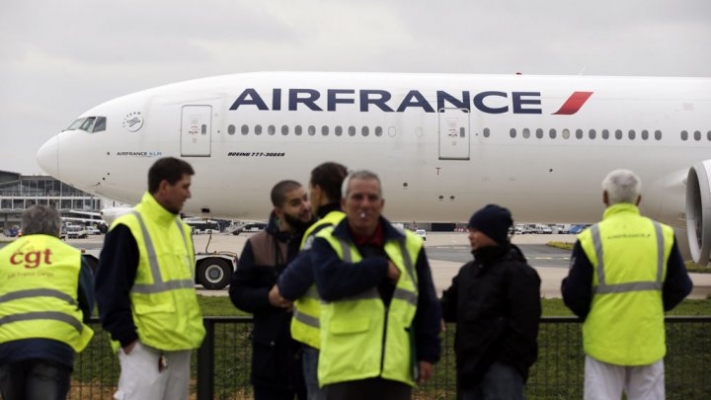France: Air France workers protest in front of the company’s headquarters at Roissy Charles de Gaulle airport
2015/10/22

Air France will cut less than a third of the 2,900 job cuts it proposed to slash in an initial plan for 2016-2017 that triggered clashes with some of its staff, the chief executive of parent company Air France-KLM said on Sunday.
The job cuts in 2016 would be voluntary and additional significant job reductions presently planned for 2017 could be avoided if talks with unions lead to an agreement on alternative cost-cutting measures by the beginning of next year, said CEO Alexandre de Juniac in an interview on RTL radio and the LCI news channel.
“If negotiations are successful by the start of 2016 we can avoid implementing Plan B for 2017, which means reverting to Plan A, or the ‘Perform’ plan,” de Juniac said, reiterating a position expressed by his board on Thursday.
The airline initially presented its Plan A, a raft of new productivity measures that would have required pilots to spend between 15 and 20 % additional time flying for the same fee. Unions protested that the increase was equivalent to six weeks of additional work without pay. At the same time as the pilots refused, the company rolled out Plan B – which included the loss of 2,900 jobs and flight cutbacks.
The announcement of the Plan B job losses led to scuffles during which senior managers had their clothes ripped by protesting staff members. Five workers were suspended without pay over the incident next they were identified from video taken of the shocking episode outside the company headquarters near Paris’s major Charles de Gaulle airport.
- Related Articles
-
Aluminium-Lithium Alloys Fight Back
2017/09/16 At the same time as it comes to the aviation industry, new technologies and manufacturing techniques have been mounting a silent revolution in the new generation of commercial twin-aisle aircraft: the Boeing 787 Dreamliner and Airbus A350. Both these aircraft contain around 50% of CFRP composites, as opposed to their previous iterations where aluminium alloys had dominated. This explains why, at the same time as Boeing and Airbus introduced these two crafts several years ago, most experts thought that the next generation of planes would be made out of composites, a trend that would again expand to include smaller jets – but as turns out, they were wrong. -
UNWTO: International tourism – strongest half-year results since 2010
2017/09/09 Destinations worldwide welcomed 598 million international tourists in the initial six months of 2017, some 36 million additional than in the same period of 2016. At 6%, increase was well above the trend of recent years, making the current January-June period the strongest half-year since 2010. Visitor numbers reported by destinations around the world reflect strong request for international travel in the initial half of 2017, according to the new UNWTO World Tourism Barometer. Worldwide, international tourist arrivals (overnight visitors) increased by 6% compared to the same six-month period last year, well above the sustained and consistent trend of 4% or higher increase since 2010. This represents the strongest half-year in seven years. -
Peugeot-Citroen lifted by Iran sales
2017/08/28 French auto giant Peugeot Citroen (PSA) said Thursday world sales rose slightly in the initial half with its Iran comeback compensating for problems in China where volumes plunged by almost 50 %. Between January and June, PSA's sales in China fell by 48.6 % to 152,380 units, while in Europe, its major market, turnover was down 1.9 % to 1.03 million units, largely due to a poor performance by its luxury DS brand.French auto giant Peugeot Citroen says global sales rise slightly with Iran comeback, despite problems from China market. -
US LNG exports make European market more competitive
2017/08/27 The European gas market is becoming additional and additional competitive and US exports of liquefied natural gas (LNG) are part of this landscape, Francis Perrin, energy expert, chairman of Energy Strategies and Policies (France) told Trend. “Energy is always a strategic business. Economic aspects are very significant of course, particularly the price of LNG, but nations as well take into account strategic issues. For some Central and Eastern European nations one of the key priorities of their energy policies is the diversification of their supplies, in particular gas imports, in order to reduce their dependence on Russia,” said the expert. -
France and Italy quarrel over shipyard and Libya
2017/07/29 French president Emmanuel Macron called Italian prime minister Paolo Gentiloni on Thursday evening (27 July) to defuse tensions amid accusations of "colonialism" in Libya and economic "protectionism". The call was "friendly", Gentiloni's office said, hours next his government had stated that a French decision to nationalise a shipyard was "critical and incomprehensible". The French government decided on Thursday to "temporarily" take control of the STX shipyards, in Saint-Nazaire, western France, in order to block a takeover by Italian national-owned company Fincantieri, which was due to take result on Saturday.
-
- France News
-
- FRANCE: Aluminium-Lithium Alloys Fight Back
- AFGHANISTAN: UNWTO: International tourism – strongest half-year results since 2010
- IRAN: Peugeot-Citroen lifted by Iran sales
- ALBANIA: US LNG exports make European market more competitive
- FRANCE: France and Italy quarrel over shipyard and Libya
- FRANCE: Bastille Day Military Parade - Paris Macron shaking hands with Donald Trump's wife Melania
- Trending Articles
-
- SOUTH AFRICA: Nigeria and South Africa emerge from recession
- BAHRAIN: Aluminium Bahrain’s Line 6 Expansion Achieves 25 Percent Completion
- CHINA: Chinese-supported infrastructure projects change Zambia's landscape
- NIGERIA: The Security and Exchange Commission approves the 40th Annual General Meeting of Oando PLC
- UZBEKISTAN: Former deputy PM named Uzbekistan Airways head
- EUROPE: Ball Corporation Debuts Three New Aluminium Beverage Can Sizes











